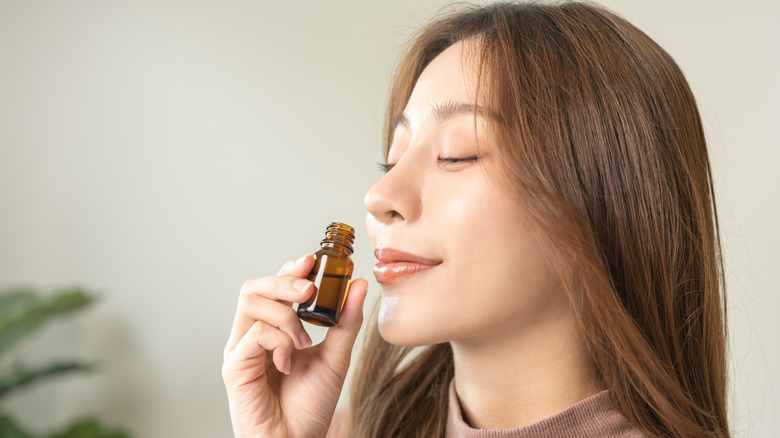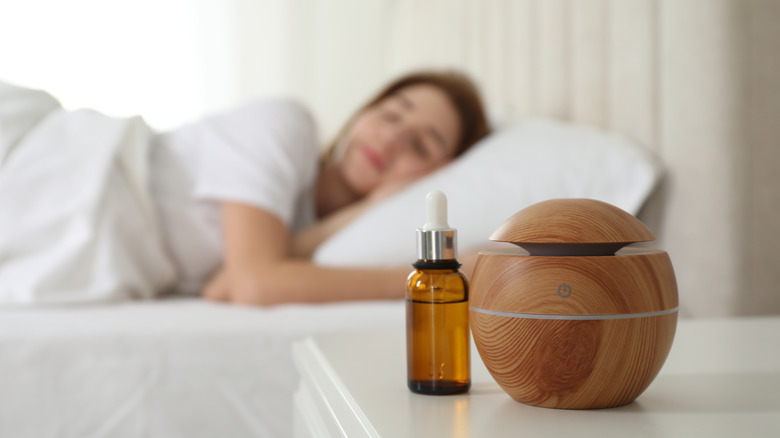The Popular Herb That May Help Prevent Infection, Reduce Inflammation, And Hydrate Your Skin
Your cabinet of personal care products could easily spill over into a whole closet, given all the creams, gels, and oils promising different health benefits. For example, you might keep an assortment of antibacterial cleansers and hand sanitizers to lower your chances of catching a cold or the flu. Or another cream could help soothe sore muscles and joints after a tough workout. Then there's the lotion or oil you rely on to ease dry skin, especially during winter.
However, there's one natural remedy that can do a bit of everything, and you may already have it on your shelf. Eucalyptus oil smells amazing in a diffuser, but it offers more than just a refreshing scent. In fact, if the aroma seems familiar, that's because eucalyptus oil is one of the main ingredients in Vicks VapoRub, the classic chest rub that helps calm a stubborn cough. Since it's diluted with other oils, you can also use VapoRub to ease aching muscles and joints (here are some other uses for Vicks VapoRub). Beyond its anti-inflammatory benefits, eucalyptus oil also has antimicrobial properties and helps your skin hold on to its natural moisture.
The health benefits of eucalyptus oil
Eucalyptus trees are native to Australia, and their essential oil is usually extracted from the leaves. While eucalyptus oil doesn't moisturize in the same way as coconut oil or shea butter, it helps protect your skin from environmental stress. According to a 2024 article in Inflammopharmacology, eucalyptus oil supports the skin's natural barrier, which can be damaged by harsh soaps and detergents. Using products with this essential oil can help prevent further damage and keep your skin from drying out.
You might also notice pain relief from creams and rubs that contain eucalyptus oil. Eucalyptus oil helps calm inflammation and soothe an overactive immune response, easing discomfort from arthritis, sore muscles, and tired joints. Eucalyptus oil's antiviral and antimicrobial properties can fight off bacteria like Staphylococcus aureus and E. coli, as well as the yeast Candida albicans. That makes it useful for protecting minor wounds from infection while also reducing swelling. You can even freshen your home by adding a little eucalyptus oil to vaporizers or cleaning solutions to help disinfect the air and surfaces.
Other uses for eucalyptus oil
If you take a deep whiff of eucalyptus oil, you might feel your sinuses wake up right away. That same invigorating scent could also give your brain a boost. A 2023 study in Frontiers in Neuroscience found that our sense of smell is directly linked to the parts of the brain involved in memory and emotion. In the study, healthy older adults used a diffuser that released eucalyptus and other essential oils for two hours each night while they slept. After six months, those who slept with the diffusers showed a 226% greater improvement in verbal learning and memory than those who didn't.
(Can eucalyptus oil manage diabetes?)
You can also take advantage of eucalyptus oil's antibacterial power by using toothpaste that contains it. Some sugar-free chewing gums include eucalyptus extract, and a 2008 study in the Journal of Periodontology found that it can help reduce plaque, gingivitis, and bleeding gums. Mixing a little eucalyptus oil with tea tree oil may also help kill lice, and a eucalyptus oil solution can even deter rodents (per WebMD). Although eucalyptus oil may support digestive and heart health, you should avoid ingesting it directly. If you apply it to your skin, dilute it with a carrier oil to prevent irritation.


